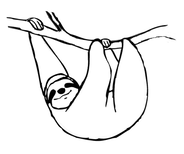|
Whether one finds the OK Boomer idiom to be hysterical, true, ageist or tacky, it's not new. Granted, OK, Boomer has a very specific usage, however we English speakers have had negative things to say about older people for quite some time.
Curmudgeon entered the English language in the 1570s, & nobody really knows where it came from. Some have posited that the first syllable may come from the word cur, meaning a dog of either vicious or cowardly demeanor, combined with the Gaelic word, muigean, meaning disagreeable person. Sadly, no data supports this. Whether we know its parentage or not, the word curmudgeon is marvelously descriptive. Those of you who appreciate vicious, nasty, or biting quotes should definitely consider The Portable Curmudgeon, by Jon Winokur, which features quotes from notable curmudgeons like Fran Lebowitz, HL Menken, WC Fields, Dorothy Parker, Oscar Levant & others. More recently, the term geezer has been the word of choice to refer to cranky, old-fashioned people. Geezer entered English in 1885 from the Cockney term guiser, which meant a silent, muttering, or grumbling person. In the 1580s, the term malcontent entered the language from French. Though the word has no association with old-fashionedness, it did refer (& still does) to a rebellious or complaining person and seems to live in the same grumpworthy category. A killjoy – another term with no age-association - is a personwho kills joy. This word came to English in 1772, simply by connecting two words that were already in use. Though the world’s most famous (or infamous) misanthrope was a curmudgeonly chap featured in Moliere’s play, The Misanthrope, the word itself has no direct connection to old ways or old age. It simply means one who hates people (landing it in my generally grumpworthy category). Misanthrope came to the language in the 1560s from Greek. In 1780 the Scots loaned English their word foggie, which we English–speakers have held onto ever since as the word fogey. The original Scottish word referred to old veterans or pensioners, & may or may not have an association with various root terms for moss, old-fashioned, or bloatedness. Codger entered the language in 1756, most likely coming from cadger, which means beggar. Cadger’s root, cadge, is of unknown origin. Americans added fuddy-duddy to English in 1871. Nobody is quite certain of its roots. It meant then – as it does now – old fashioned. Another American term most of us have lost came from the Carolinas in the 1860s. The term is mossback, & it meant conservative, reactionary, & old fashioned, which referred directly to southerners who refused to join the Confederate army, & instead of joining the cause, hid in the woods “till moss grew on their backs.” Any opinions about all these curmudgeonly words? Let me know in the comments section whether you feel these words are synonyms for OK, Boomer, or whether it belongs in its very own category. My thanks go out to this week’s sources: the OED, Wordnik & Etymonline.
2 Comments
 What's up with the words carrion, carry on & carry-on? Today, the term carry-on (referring to luggage) is probably used thousands of times more per day than the terms carry on or carrion, yet only a couple of decades ago, the opposite would have been true. To my complete surprise, the earliest printed use I can find of the luggage variety carry-on is 2006. Even more surprisingly, I can find no reliable information regarding when the term entered the language. Carry on, on the other hand (ooh, sorry about that) showed up as early as 1606 & has a variety of meanings: -to continue or advance -to prevent from stopping -to practice habitually -to behave in a conspicuous way -to conduct, manage or prosecute All this can be found buried in the nearly three full pages the Oxford English Dictionary dedicates to the word carry, which came to English through Old French from Late Latin, where it meant to convey in a vehicle. This sheds light on carry’s relationships with car, cart, cargo, chariot, & carpenter. On the other hand, carrion came to English through French from the Vulgar Latin word caronia, meaning carcass. If we follow caronia back far enough we find the Latin word caro, or meat. Carrion’s relatives include carnivore, carnal, carnival, carnage, incarnation, & reincarnation. Even the meaning of the word crone refers back to the idea of being carcass-like. Also, though etymologists haven’t finished arm-wrestling over it just yet, some argue that the word crow also comes from caro, presumably because crows include carrion in their diets. And from the Truly Unlikely Department, some etymologists argue that carbine started with caro, though this takes more explanation. It seems that during the years of the plague, people speaking Old French referred to those who bore the corpses as escarrabin, meaning carrion beetle, which morphed into a nasty epithet used to refer to attacking archers, who in time swapped in their archery equipment for small rifles, yet still got called names because they were after all, attacking. In time the epithet for the attackers became associated with their weapon of choice, the carbine. Dear readers, this week, please join me in some word play. Leave a goofy sentence in the comments box that primarily employs words addressed in this post. My thanks go out to this week’s sources the OED, Wordnik & Etymonline,  Check out these two unlikely sentences & the unlikely etymologies of the words therein. The vicar’s Ouija board turned out to be a red herring. A vicar’s job is to interpret scripture for the masses, substituting for Jesus, which is why vicar is based on the Latin word vicarious, or substitute (1300s). A Ouija board functions due to the “agreement” of the two people whose fingers rest on the planchette, thus, its name was derived from a marriage of the French & German words for yes: oui + ja = Ouija (1910). A red herring in a mystery throws the reader/viewer off the trail. This term comes from fox hunting as early as the 1680s, as nefarious characters (or members of the Save the Beleaguered Fox Brigade, I presume) might drag a red herring across the fox’s trail, causing the hounds to veer off in the wrong direction (apparently the reek of the red herring is infamous). Our second unlikely sentence using words with unlikely etymolgies includes a word once quite acceptable, but now considered offensive: A moron moseyed through the bedlam in the nick of time. The now-offensive term moron reflects Dr. Henry H. Goddard’s impression of the mental capacity of pre-teens. In 1910 he defined his term as meaning dull, stupid, silly or foolish, and introduced the word moron to apply to adults whose mental aptitude coincided with the abilities of 8-12 year olds. I'm not inclined to use this idiom, but I find the etymology intriguing. The word mosey is the flipside of the word vamoose – the former meaning to leave in a languid fashion & the latter meaning to leave speedily. Bedlam was born as the nickname for a London-based priory, St. Mary of Bethlehem, which became a home for the mentally unstable, famous during part of its tenure for the screams of its inmates (1418). Though nick of time wasn’t recorded until the 1640s, the story is that some Medieval churches and colleges recorded attendance by notching a stick. When a parishioner or student arrived, a nick was cut into the stick. The last one to arrive on time would receive the nick of time. This week’s unlikely etymologies were inspired by Jordan Almond’s Dictionary of Word Origins (Carol Publishing Group, 1999) - backed up by the OED, Merriam Webster, & Etymonline,  Last week, upon joking with my wife that I was “plying her with wine,” I found myself wondering about that usage of the word ply. What I discovered was far more rich and robust than the inexpensive swill we were sharing for dinner. One might even argue that the word ply has an “intriguing bouquet, a delightful aftertaste & a remarkable finish.” The Oxford English Dictionary devotes about a half page to the word ply, which initially meant to apply, employ, or work busily at, and entered English in the late 1300s from Middle French. Before that, it spent some time in Latin, & before that it resided in a hazily defined tongue etymologists call “Proto-Indo-European.” The meaning I was using at the dinner table, to press one to take, appeared first in 1676, but ply also has all these meanings: -to bend, bow, fold, or double -to bend in will or disposition -to adapt or accommodate -to yield or be pliable -to bend in reverence -to bend, twist or writhe forcibly -to comply or consent -to cover with something bent or folded -to draw out by bending or twisting -to occupy oneself busily -to use, handle or wield vigorously -to practice or work at -to solicit with importunity -to beat against the wind -to steer -to traverse by rowing or sailing This modest three-letter word (or word part) plays a role in these words & more: plywood, pliant, comply, compliance, compliant, apply, appliance, application, multiply, multiplication, reply, complex, plectrum, pliers, & (believe it or not) flax. This week, please ply me with a question. What word have you heard or used recently that caused you to think, “Hmmm. Where’d that one come from?” My thanks go out to this week’s sources: Merriam Webster, the OED, Wordnik & Etymonline.  Ah, slothfulness. Lazing about doing nothing useful. Nothing like it. Some good folks published an entire dictionary about it in 2011. Sloth - A Dictionary for the Lazy, is a part of Adams Media’s The Deadly Dictionaries series. This particular volume defines 154 pages worth of lazy-related words, interspersed with sloth-related quotations. Here are some highlights: aposiopesis – noun – (1570s) the state one is in when one stops speaking mid-sentence, either due to the inability to finish the thought, or sheer stubbornness. fainéant – noun – (1610) a lazy person or slacker. Also an adjective to describe such a person. hebetude – noun – (1620s) state of laziness or indolence. looby – noun – (1377) an awkward, lazy person or lout. shilly-shally – verb – (1703) to vacillate or be indecisive, to dawdle or waste time. somniferous – adjective – (1600) having the ability to cause sleepiness. sponger – noun – (1670s) one who allows others to provide all his/her needs, a freeloader. weltschmerz – noun – (1875) the state of being world-weary, pessimistic or apathetic. Followers, what slothful words do you appreciate? Let me know in the comments section. My thanks go out to this week’s sources the OED, Sloth – A Dictionary for the Lazy, & Etymonline (image from BetterColoring.com). In tribute to the public servants putting themselves in harm's way through exposing the truth during the impeachment hearings, how about a look into the roots of the words public & service?
Public showed up in English in the 1300s as an adjective through Old French from the Latin word publicus, meaning of the state, of the people, general, ordinary, or vulgar (oops – someone’s elitism is showing). By the 1600s public was also being used as a noun, meaning commonwealth, or public property. It is related to the words people, populace, popular, publicity, publican, puberty, & pub. Its medieval English synonym, folclic, sadly, never made it out of the Middle Ages. The word public first aligned itself with the word service in 1893, giving us public service. Service also came through Old French from Latin, though it appeared in English two centuries before public. The Latin donor word was servitium, which meant slavery or servitude, and came directly from the Latin word for slave, servus. Within a century, service’s meaning had generalized to simply mean the act of serving (not necessarily due to enslavement). By the late 1400s tea service was born and by the 1500s service picked up its military meaning. In 1941 service & industry found one another & service industry was born. But back to the public servants testifying in the impeachment hearings. Most of us don't have the skinny on people in power, but w can still provide a l little public service: Moving a grocery cart so it won’t whack into someone’s car, Recommending a great book, Offering a hand to someone who could use it, Contributing time or resources to a social or environmental cause... Maybe afterward we could all meet somewhere where we can enjoy being served – like maybe the pub. Please leave a note in the comments section about some public service you’re aware of that warms the cockles of your heart (there’s a future Wordmonger post, eh?) or a public service you’re likely to engage in this week. My thanks go out to this week’s sources: Collins Dictionary, the OED, United Nations, & Etymonline, I’ve always been fond of the word ilk. It’s just far enough outside the everyday words of my suburban American life that hearing it sparks that unexpected thrill of baklava or pointilism or mariachi music – just rare enough to make me smile.
In Old English, ilk was spelled ilca & meant same. It could be used as both a noun & adjective. It came from the Proto-Germanic word, ij-lik, which also spawned the recently beleaguered word, like. I’ll admit it, I am among those annoying teachers & adults who frown upon the use of the word like as a filler: Like, the word ilk just makes me smile. It also curdles my cheese when like is used as a discourse particle -- I’m like, “Dude, I love the word ilk.” Though many assume that Moon Unit Zappa & all those Valley Girls are responsible for both twisted usages, the discourse particle usage predates Moon Unit’s birth (1967) & the first written instance of like as a filler appeared in1886 in Kidnapped by Robert Louis Stevenson: “’What’s like wrong with him?’ said she at last.” Heavy sigh. Interestingly, some other earlier forms of the adjective like didn’t make it to the modern vernacular, but instead, faded out in the 1700s. Consider the words liker & likest: The moon is liker the earth than the sun. Osbaldo is the person likest me in my family. My wonderful 1959 Webster’s new World Dictionary suggests that like can function as all these parts of speech, though I find the asterisked ones hard to swallow: a verb - Phoebe likes figs smothered in melted brie. an adjective – After Garcon’s outburst, Consuela responded in like manner. a noun - Like attracts like. an adverb - Due to his old Anglo-Saxon work ethic, Yalmer works like mad. a pronoun* - Ahmed was like a man possessed. a conjunction* - It was just like Ludwiga said, Terence simply had no sense. a preposition* - Quimby is like a walking encyclopedia. and as a suffix - When he pouts like that, Umberto can be so childlike. Dear followers, what do you have to say about the usage (or misusage) of like, or about the sheer beauty of ilk? My thanks go out to this week’s sources the OED, Merriam Webster, The Hot Word, Denise Winterman’s BBC article, & Etymonline,  Don’t you love those words that can mean exactly the opposite of what they mean? They’ve been called many names over the years, though none of those names have really stuck: contranyms, antilogies, eniantodromes, and Janus words. I’m fond of that final one, which refers to the two-faced Roman god of transitions, Janus. A few of my favorite Janus words: Fast: either something can hold fast, or it can move fast. Strike: either I can strike the ball or miss the ball & strike out. Garnish: either a garnish is something added, like parsley on one’s dinner plate, or something subtracted, as in garnished wages. Citation: I can receive a citation of merit for some good deed, or a traffic citation for a deed of vehicular repute. Bill: either one receives a bill for what one owes, or one can be paid in bills when one is owed. Host: I can be helpful by hosting a website or hosting a party, or I can cross to the dark side and host a disease. Oversight: I can be in charge of the oversight of employees, or I can ignore my responsibilities & be guilty of oversight. Swipe: I can do what the society honors and swipe my credit card, or I can do what society abhors & swipe something off the shelf. Dear followers, what other Janus words would you add to the list? My thanks go out to this week’s sources the OED, Fun With Words &Etymonline, Janus image source  As the holiday season approaches, it’s likely we’ll all soon be enjoying some beverages. So, here’s to all that: Sip comes from a Low German word, sippen, meaning to sip. It entered English as supan in the 1400s. Gulp also entered the language in the 1400s & appears to be onomatopoeic, meaning to gush, pour forth, guzzle or swallow. Gulp most likely came from the Flemish word gulpe, which meant stream of water or large draught. Slurp is most likely another onomatopoeic word. It came from the Dutch word slurpen & entered English in its verb form in the 1640s, but took until 1949 to become a noun. Glug is also onomatopoeic & showed up in the language in 1768 from some unspecified source. Slug was first recorded meaning take a drink in 1756. It may have come from the Irish word slog, to swallow, or from a colorful English idiom meaning to take a drink, to take a slug. In the 1540s, the noun swig meant a big or hearty drink of liquor. A century later, swig graduated into use as a verb. By 1889, the idiom to take a snort entered English, meaning to have a drink of liquor, especially whiskey. Whether you’re gulping, slurping, demurely sipping or letting down your hair & taking a snort, may the season's liquid refreshments bring you joy. Oh, & please feel free to leave a comment. My thanks go out to this week’s sources the OED, Wordnik, Merriam Webster, & Etymonline,  English is rife with idioms involving walking. Most have pretty shakily documented origins, but here are a few verifiable ones: In the 1570s the idiom walking stick was born. In 1769 the first written usage of walk the plank occurred. In 1846 the idiom walking sickness was coined. Oddly, the term walking pneumonia has unclear beginnings, though the particular strain (mycoplasmal pneumonia) was named “atypical pneumonia” in 1938. In 1848 the idiom worship the ground s/he walks on entered the language. A walk in the park was born in 1937, and sometime thereafter, the term no walk in the park was conceived. And imagine my surprise. The term walking bass didn't start with stride piano and musicians like the inimitable Fats Waller. The walking bass was created over two centuries earlier by Johann Sebastian Bach & his baroque pals. My musical ignorance is showing. In a similar vein, though most people of my generation might assume the idiom a walk on the wild side was conceived in 1972 by songwriter Lou Reed, the earliest usage of the phrase was actually Nelson Algren’s 1956 novel, A Walk on the Wild Side. The idiom walk the green mile comes from the death row of an infamous Louisiana prison, in which the condemned took their final walk down a hallway of green linoleum. World War I gave us many idioms, among them (sadly) the walking wounded. The walk a mile in someone’s shoes idiom comes from the Cherokee. Interesting that the original walked-in shoes were moccasins. What do you bet nobody paid for the idiom? Please add a comment, or a walking idiom I haven’t included. My thanks go out to this week’s sources the OED, Wordnik, The Word Detective, & Etymonline, |
I write for teens & tweens, bake bread, play music, and ponder the wonder of words in a foggy little town on California's central coast.
To receive weekly reminders of new Wordmonger posts, click on "Contact" & send me your email address. Archives
November 2023
|


 RSS Feed
RSS Feed